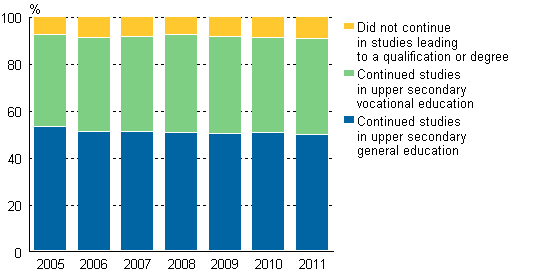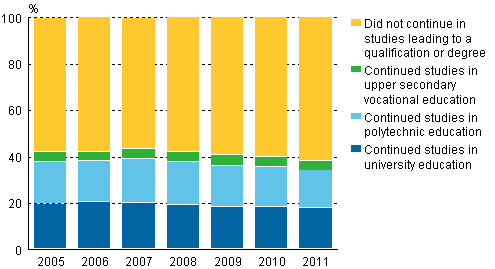Published: 13 December 2012
Immediate continuation of studies was increasingly difficult in 2011 for both completers of the 9th grade of comprehensive school and new passers of the matriculation examination
According to Statistics Finland, immediate continuation of studies was still more difficult in 2011 than in the year before for both completers of the 9th grade of comprehensive school and passers of the matriculation examination. Nine per cent of completers of the comprehensive school and 62 per cent of new passers of the matriculation examination failed to get a place for further studies. The share of those left outside further studies leading to a qualification or degree grew by nearly one-half of a percentage point for completers of the 9th grade and by 1.5 percentage points for passers of the matriculation examination from the previous year.
Direct transition to further studies of completers of the 9th grade of comprehensive school 2005 - 2011, %

Completers of the 9th grade of comprehensive school numbered around 63,200 in 2011, which was one thousand less than one year earlier. Fifty per cent of them (58 per cent of women and 42 per cent of men) went on to study in upper secondary general school, and 41 per cent (33 per cent of women and 49 per cent of men) went on to attend upper secondary level vocational education. The remaining nine per cent did not immediately continue studies leading to a qualification or degree. They may have continued studies not leading to a qualification, such as additional education of the comprehensive school (tenth grade) or counselling and preparatory studies for initial vocational education (Career Start).
The share of those left outside studies leading to a qualification or degree was slightly higher than in the previous year, even though the share of those that did not apply for a student place at all decreased. Nearly all completers of the 9th grade of comprehensive school applied for further studies as 1.5 per cent did not do so.
The share of completers of the comprehensive school who continued to upper secondary general education was highest in the region of Uusimaa and the number who continued to vocational education was highest in the region of North Karelia. The number of young people who did not continue to any studies leading to a qualification or degree after the comprehensive school was relatively highest in the comprehensive schools of the region of Päijät-Häme.
Direct transition to further studies of passers of the matriculation examination 2005 - 2011, %

New passers of the matriculation examination numbered 32,800 in 2011, which was slightly more than in the previous year. Eighteen per cent of them entered university education and 16 per cent entered polytechnic education in the autumn of the year they passed the exam. Four per cent entered upper secondary vocational education.
Clearly over one-half, or 62 per cent, of the passers of the matriculation examination in 2011 did not continue studying in their year of graduation. The share of those left outside further studies has increased over several years and it continued growing in 2011. Seventy-six per cent of the new passers of the matriculation examination applied for further studies. The share of applicants was good one-half of a percentage point lower than a year before.
Entry to university education was easiest for students from the regions of Ostrobothnia and North Karelia. The largest numbers of students continued to polytechnic education in Ostrobothnia and Central Ostrobothnia. Those having passed the matriculation examination in Uusimaa remained most frequently outside further studies.
Source: Education. Statistics Finland
Inquiries: Riikka Rautanen 09 1734 2375, Ritva Kaukonen 09 1734 3311, koulutustilastot@stat.fi
Director in charge: Jari Tarkoma
Publication in pdf-format (230.3 kB)
- Tables
-
Tables in databases
Pick the data you need into tables, view the data as graphs, or download the data for your use.
Appendix tables
Updated 13.12.2012
Official Statistics of Finland (OSF):
Entrance to education [e-publication].
ISSN=1799-4527. 2011. Helsinki: Statistics Finland [referred: 19.4.2025].
Access method: http://stat.fi/til/khak/2011/khak_2011_2012-12-13_tie_001_en.html

